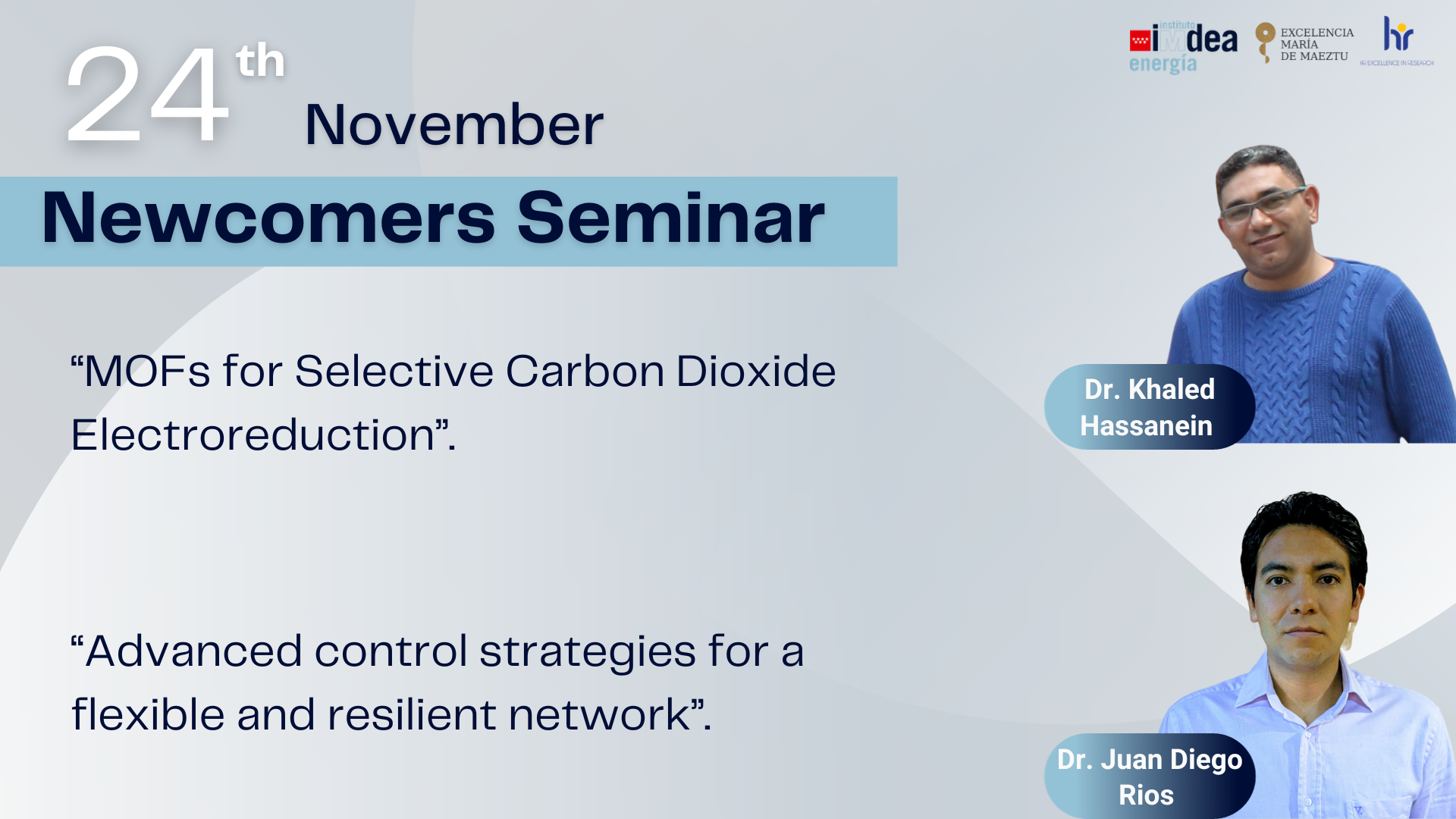Newcomers Seminar

Next November 24th at 12 we will hold a new session of the seminar for newcomers in the auditorium.
The first speaker will be Dr. Khaled Hassanein , from the Advanced Porous Materials Unit, with the talk entitled “MOFs for Selective Carbon Dioxide Electroreduction”.
The second one will be Dr. Juan Diego Rios , from the Electrical Systems Unit, with the talk “Advanced control strategies for a flexible and resilient network”.
Dr. Khaled Hassanein is, currently, a postdoc researcher at Imdea Energy institute within Advanced Porous Materials Units under the supervision of Dr. Patricia Horcajada. After his PhD, Dr Hassanein has performed several postdoctoral stays at international entities such as King Fahd University for Petroleum and Minerals (KFUPM) within Omar Yaghi Chair Program for CO2 Capture and Utilization (Jan 2020-Sep 2023)., Marie Curie Fellow with a project entitled: Smart Metal Organic Frameworks for Sensing Volatile Organic Compounds (MSCA-IF-2016)/Grant Agreement number: 751175) at (ISOF) – CNR-Italy (Jun 2017-Dec 2018).
He got his BSc in Chemistry and Physics from Cairo University (2007, Egypt) and a MSc in Nanoscience and Molecular Nanotechnology from Universidad Autónoma de Madrid (2013, Spain).Previously, Dr. Hassanein has obtained his PhD within the frame of a FPI, (Formación Personal Investigador) Fellowship funded by the Spanish Ministry of Science and Innovation, from the Inorganic Chemistry department, Universidad Autónoma de Madrid, under the supervision of Dr Felix Zamora and Dr Pilar Amo (April 2016).
His current and future perspective research activities are focusing in the domain of coordination polymers (CPs) and metal organic frameworks (MOFs), from their synthesis to their applications in diverse strategic fields such as sensing, optoelectronics, gas storage and separation, CO2 capture and utilization and energy.
Abstract – MOFs for Selective Carbon Dioxide Electroreduction
Recently, Metal–organic frameworks (MOFs) have shown great potentiality as electro-active catalyst for CO2 electroreduction, whoever, providing a stable, effective, and selective catalyst is still grand challenge. Defect-engineering of MOFs is an exciting strategy to tailor material properties and incorporate multiple active species into MOF structure. In that regard, modulated synthesis provides an important tool to synthesis MOF with multifunctionality. Immobilization of electro-active molecular catalyst, onto stable and scalable MOFs, provides an effective strategy to prepare MOF based electro-active catalysts with improved efficiency, selectivity and can be consider as economically viable approach
We have implemented different strategies to prepare MOF based catalysts for CO2 electroreductions. In attention, we have provided simple strategy to shape MOFs as thin film for CO2 electroreductions.
Dr. Juan Diego Rios Peñaloza received the B.Sc. and M.Sc. degrees in electrical engineering from the University of Bologna, Italy, in 2012 and 2014, respectively. From 2014 to 2017 he worked in the transmission system operator of Bolivia, ENDE Transmisión, as an electrical protection engineer. He received the Ph.D. degree in electrical engineering from the University of Bologna in 2021, where he stayed as a research fellow until August 2023. He is currently working as a postdoctoral researcher in the Electrical Systems Unit of IMDEA Energía. His research interests include the analysis of power systems transients, power systems protection, integration of distributed energy resources in the distribution network, control of power converters, and microgrids.
Abstract –Advanced control strategies for a flexible and resilient network
Majority of renewable energy sources are connected to power networks in a distributed way, just opposite to conventional power plants that are centralized and connected at the transmission system level. They show variable and intermittent features, in a similar way to electricity consumption, while the balance between generation and load must be met at every time instant. As a result, to ensure the security and flexibility of the power system, the deployment of renewable sources must entail an equally relevant deployment of energy storage systems. As these Distributed Energy Resources (DERs) are increasingly replacing large and centralized power plants, the overall system inertia is rapidly decreasing, as well as the capabilities of frequency and voltage regulation. This constitutes a main cause of the increased risk of instability in modern power systems, in particular it is prominent in weaker and smaller systems such as Microgrids (MGs). To mitigate the negative impacts and fully exploit the benefits of renewable and distributed resources, advanced control strategies need to be developed, using a paradigm of active and coordinated network management. In addition, Demand-Side Control (DSC) strategies can enhance the flexibility and resilience of the power system, but its implementation in the residential and commercial sectors is still tested at the experimental level. In this context, the project aims to improve the stability of MGs by designing advanced control schemes for distributed energy resources, and by enabling loads to participate in the power system regulation to guarantee the continuity of supply under a paradigm of efficient and reliable operation of all grid assets.


